Previous Article
Next Article
- AM WORLD
- FEATURES
- 100 YEARS OF ASTON MARTIN
- ARCHIVE
TRAVEL
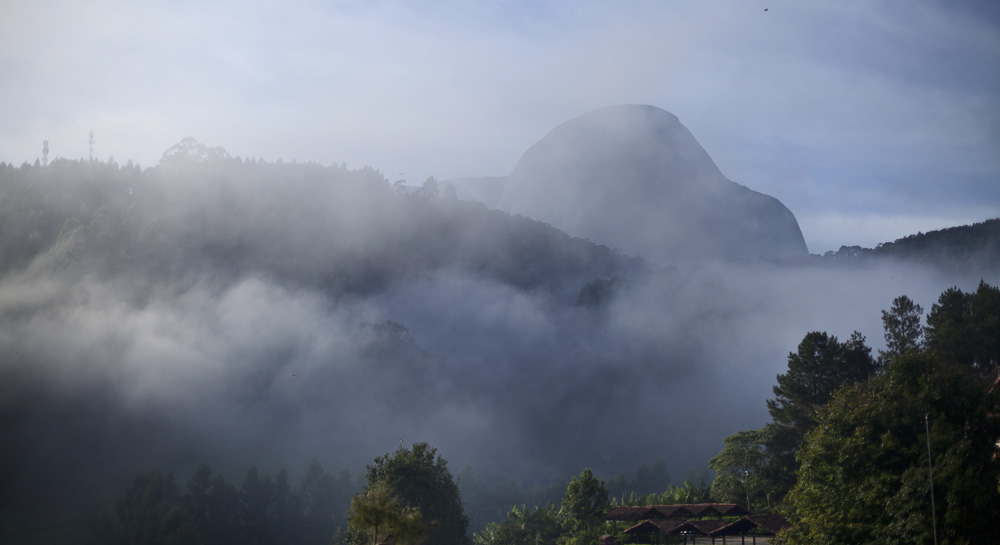
THE PERFECT BLEND
Fiona Sims travels to the Esprito Santo region in Brazil in search of the world’s finest coffee and to track down the exotic bird at the heart of its production
T he noise sounds a bit like a pheasant being strangled—but the screeching echoing across the valley in the Espírito Santo region of Brazil isn’t coming from anything living, it’s a ringtone. Henrique Sloper de Araújo holds his mobile phone to the sky and motions for us to keep quiet. We’re on the hunt for a jacu bird and he is hopeful that the recording might tempt the real thing to show itself. Why such determination to find one? Because the jacu bird is the reason we’re here. Sloper de Araújo grows organic coffee and he owes his fame to this native black bird—or rather, ahem, to its droppings.
Twelve years ago, Sloper de Araújo was on holiday in Indonesia when he decided to check out kopi luwak. The world’s most expensive coffee is made using beans excreted by the Asian palm civet, which seeks out the best cherries, then works its digestive magic on the expelled beans.
“Actually, I think kopi luwak tastes rather horrible, but it did get me thinking,” explains Sloper de Araújo, who had noticed similar droppings, where the digested beans were still intact, on his estate, Camocim. Like kopi luwak, the jacu bird is only interested in the ripe fruit of the cherry that surrounds it, so he gathered a batch together and began experimenting with it.
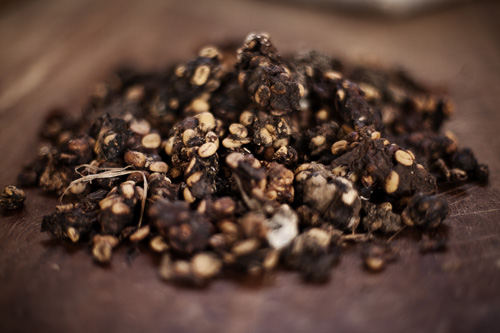
The odourless droppings are dried, cleaned and stored in their parchment for up to three months
Early results were positive, so after persuading his incredulous workers to pick up as much bird poo as they could find, he set about processing the coffee-drying, cleaning, then storing the beans in their natural parchment.
Inevitably the media heard about it, declaring it the Brazilian kopi luwak, and the next thing Sloper de Araújo knew, the coffee was being featured on a popular TV show, with an expert coffee taster wheeled in to sample it blind. She was rapturous, his phone lines jammed and the rest is history, as they say. But the progamme also included an item on jacu birds feeding—and it was only as Sloper de Araújo was watching it that he realised why the coffee tasted so good—the birds were singling out the best beans.
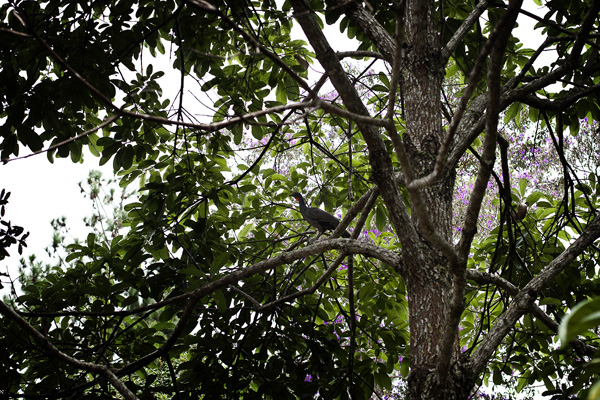
The jacu bird feasts on the ripe coffee cherries, which give the coffee a distinctive, mild, nutty sweetness
But with that quality and rarity comes a hefty price tag. A cup of Jacu Bird coffee will set you back €12 in Paris (top French chef Alain Ducasse is a fan and sells it in his restaurants). Sloper de Araújo sells roasted Jacu Bird coffee for US$55,000 per 60kg bag, which compares to US$300 per bag for his regular coffee.
Predictably, other growers in Brazil have followed suit—the jacu bird is native to Brazil and prolific in the Atlantic Forest, but Sloper de Araújo claims to be the only producer who farms and exports the Jacu Bird coffee, which has helped to raise his profile around the globe. Paris is now his number one market, followed closely by Japan.
Brazil isn’t generally known for its quality coffee, yet it grows more than any other country—some 50 million bags, capturing 35% of the market.Next in line is Vietnam, followed by Colombia, Central America and Africa. But Sloper de Araújo and the Brazilian Speciality Coffee Association, which he is currently president of, wants to change that, with the emphasis on quality replacing quantity.

Above left: Sloper de Araújo (far left) with a couple of his team who search for the jacu droppings in the rainforest. Above right: Sloper de Araújo standing proudly in front of a portrait of his grandfather, who used to run the family estate at Camocim.
In addition to the six Camocim Organic Estate-grown coffees, including the jacu bird, Sloper de Araújo sources organic coffee from other like-minded growers around Brazil, which he packages under the Camocim Origins label, and which also sells like hotcakes (a limited selection is available in the UK at Monmouth Coffee or can be bought online at www.seaislandcoffee.com). The organic coffee market grew by 17% last year, compared to a 3% growth in regular coffee, and only a fraction of Brazil’s coffee is grown organically so demand easily outstrips supply. “Though I’ll tell you this—I never thought I’d be growing coffee at 40,” he confesses.
Sloper de Araújo’s family business was in women’s fashion retail. There were eight department stores around the country, established a century ago, before the family were forced to sell up (times had changed), leaving his grandfather, Olivar Fontenelle de Araújo, to run the timber business at Camocim, and Sloper de Araújo to manage the family’s commercial real estate interests, that is, when he wasn’t surfing, snowboarding and motorbiking. Sloper de Araújo was one of the original flip-flop executives. But when timber prices took a dive thanks to cheap Indonesian imports, his 90-year-old grandfather had a re-think and in 1999 planted organic coffee on his 300-hectare estate. “It just goes to show that you can re-invent yourself at any age,” grins Sloper de Araújo.
The estate is Edenic, like much of Brazil, and borders the beautiful Pedra Azul national park with its spectacular rock formations, rivers, waterfalls, and the towering Pedra Azul (Blue Rock), the park’s jaw-dropping trademark peak.
As the crow flies, it’s only 80km to the sea, or a hair-raising 90km drive from the regional capital, Vitória, on a busy highway that climbs steadily towards Belo Horizonte in the neighbouring state. The estate is at the highest point, 1,350m, and the air is markedly cooler here—it’s no surprise that it draws many tourists, who can hike in comfort, frolicking in the area’s lakes and rivers. And it’s drawing quality coffee growers, too, attracted by the daily temperature fluctuations. There’s a 15-degree difference between day and night, which is important for growing coffee, explains Sloper de Araújo. He was the first to realise the area’s potential for large-scale coffee growing. “The moment I saw these plants doing so well here, I fell in love with coffee. It smells like life, doesn’t it?” he says, thrusting a handful of rich, red clay soil underneath our noses.
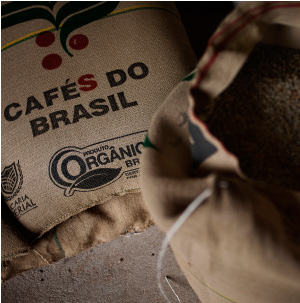
The finished product sells for a cool US$55,000 per 60kg bag
We’re standing by the first organic coffee plants that were grown here, radiating glossy health, the cherries ripening nicely under the warm sun. It’s flanked by a banana tree, which acts as a windbreaker, and nitrogen-rich mamona plants. Wild flowers stretch for as far as the eye can see, jabuticaba and pitanga trees are heavy with fruit. “This is the secret to Camocim—all this organic matter on the ground,” he says, flipping a small rock with his boot. A toucan flaps by and, just as the cicadas threaten to drown us out with their chatter, Sloper de Araújo kicks back a wooden plank to reveal a deep trough of funky smelling mulch, a mix of cow dung, eggshells and rock dust. “Those are my preparations,” he announces.
If you’re familiar with biodynamic farming, then you will already know about the curious “witch’s brew” of natural potions that aid the soil and promote healthy growth, with the land worked according to the lunar rhythms.
“I’ve always been connected to the earth’s energies. Astrology has guided me through life. So it wasn’t such a big leap to take this estate to the next level. But explaining biodynamic farming to a Brazilian layman? Now that was another matter,” he chuckles.
The locals clearly thought he was crazy, but his efforts have since helped to bring quality in the region. The estate has been certified since 2009, with a little help from a few famous biodynamic winemakers, among them Alvaro Espinoza in Chile, and Nicolas Joly in the Loire.
“You know, there are a lot of similarities between quality coffee growing and boutique winemaking,” he says. In fact, he uses the model of a top vineyard for the estate, singling out varietals for their particular flavour characteristics, looking at what kind of soils they grow best in, and where they are grown, picking only when each fruit is ripe, and processing the fruit separately. Less than 1% of Brazil’s coffee industry pick and process selectively like they do at Camocim.
Sloper de Araújo is one of only two non-winegrowers that belong to a biodynamic wine group called Return to Terroir (return-to-terroir.com), created in 2001 by the formidable Joly.
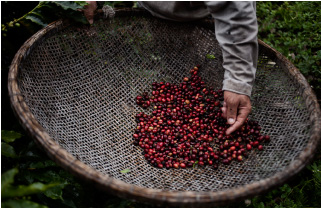
The ripe beans are collected to begin the process, which ends with the coffee being served in Alain Ducasse's restaurants around the world at €12 a cup
“I first met Joly when he came to Brazil to visit his importer and we just clicked. The difference in my plants now that I’m fully biodynamic is amazing. They are so much healthier. I’m convinced that it gives you better quality fruit, with more antioxidants, aroma, taste and nutritional value,” he says. “But above all, it’s about preserving natural resources and maintaining biodiversity.” Ecology and the environment are hot issues in Brazil. Having chopped down an area of forest the size of Belgium, including trees more than 500 years old, there has been a big shift in the past two decades, as Brazil is more aware of the environment and fears about global warming have added extra urgency.
The world’s fifth-largest country is now the sixth-biggest economy and it’s aiming to become the world’s largest food producer. Already the biggest producer of sugar and orange juice and second-largest beef producer, sustainability is now central to Brazil’s plans. Deforestation is monitored daily and an increasing number of environmentalists predict that in 10 years there may be no deforestation at all, which is a remarkable turnaround.
Meanwhile, back in Pedra Azul, the environment police are cracking down hard on poachers. The jacu bird used to be hunted extensively, now it’s a protected species, which suits Sloper de Araújo just fine.
“Look, over there —do you see it?” he whispers excitedly, pointing at a large black peacock-like bird perched on a branch a few metres away. We are lucky to get a glimpse, as most of the coffee is harvested between April and October and right now the birds prefer to hang out deep in the forest with its abundant wild berries.
The jacu bird’s all-time favourite snack is ripe Yellow Bourbon coffee cherries, one of seven different varieties of Arabica bean that Sloper de Araújo grows on the estate. It turns out that it’s my favourite, too, though I’m not about to start drinking rare and ruinously expensive coffee for breakfast everyday, however good.
For more information about visiting Camocim go to www.camocimorganic.com
TASTING COFFEE WITH A “Q” GRADER
There are 10 different coffees on the table in front of us, four cups of each. The samples have come from different bags so the quality may vary, warns Rafael Marques. Marques is one of the world’s top “Q” graders (licenced graders of coffee quality), and, at 27 years old, the youngest in Brazil.
He is also a consultant to Sloper de Araújo, and is on-hand to guide us through a professional (blind) tasting.
“The more dense the colour, the better quality the coffee,” he explains. “For me, acidity is the most important thing,” adds Sloper de Araújo. All but one of the coffees belong to Camocim.There’s a bog-standard Brazilian coffee, Robusta, in there somewhere too.
Sloper de Araújo and Marques then dispel a myth: smelling a freshly opened bag of roasted coffee will not give you any indication of the quality. And here comes another—you should never use boiling water to make coffee because it scorches it—96°C is the optimum temperature, they tell us.
Noses and palates primed, we’re looking out for flavours and aromas that include caramel, chocolate and nuts. Though it’s not so good, if we start singling out earth, straw or basmati rice, and the coffee is really in trouble when you start identifying a whiff of cooked beef or burnt rubber.
The Q grader tastes the coffee at three different temperatures: 70°C, 60°C and 50°C. “Sweetness kicks in when the coffee is cooler,” says Marques. Just like wine tasting, you take in air with each slurp, which is sucked straight off a specially designed spoon. And we score the coffees rather like wine, too, using a 100-point system.
A favourite is Iapar and Yellow Yourbon, but our highest-rated is the Jacu Bird—Marques gives it 92 points.
What’s the highest score Marques has ever given to a coffee? “97 points to a coffee from Panama in 2006,” he recalls. In his Q-grader world, above 85 points is seriously good coffee. We finish with the Robusta, which tastes mouldy, with tongue-curling medicinal flavours on the finish.
“Most roasters are in the business of making money, not giving you good coffee,” shrugs Sloper de Araújo, who reckons that the region will boast a coffee ranked in the world’s top-five before long. For now, though, Espírito Santo has to be content with a position in the world’s top-10 coffees, and you can thank Sloper de Araújo and his associates for that.
TOAST OF THE TOWN
Pousada Pedra Azul
Rodovia B262, km88, Domingos Martins, Pedra Azul
Tel: +55 27 3334 2420, www.pousadapedraazul.com.br
Recently renovated by top Brazilian architect Zanini de Zanine (opening July 2013), a stylish inn offering breathtaking views over the Blue Rock.
Café do Rafa
Avenue Antonio Roberto Feitoza 164, Venda Nova do Imigrante
Tel: +55 28 3546 2155
Opened three years ago by one of Brazil’s top “Q” graders, Rafael Marques, the coffee was always going to be good at this young, buzzy café.
Espaço Vellozia
Rod BR262, KM89, Domingos Martins, Pedra Azul
Tel: +55 27 3248 0097, www.espacovellozia.com.br
Chef Elizandra Euvira Modolo rules the kitchen at this innovative restaurant that makes the best of local produce but is inspired by French classsics.
Restaurante Aleixo
Rue Aleixo Netto 1204, Vitória
Tel: +55 27 3322 7400, www.restaurantealeixo.com.br
Brazil has a number of top female chefs and among them is Cinthia Paixăo, who is cooking up a storm at this stylish eatery in downtown Vitória.
Previous Article
Next Article
- AM WORLD
- FEATURES
- 100 YEARS OF ASTON MARTIN
- ARCHIVE
